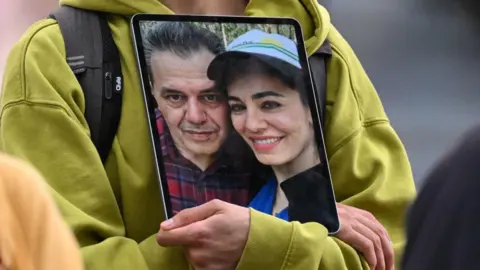Iran says German-Iranian died before execution could be carried out
 AFP
AFPIran’s judiciary has said Iranian-German dissident Jamshid Sharmahd died before his execution was reported by state media late last month.
The judiciary’s news agency said on 28 October that Sharmahd - who was sentenced to death on the charge of "corruption on Earth” in 2023 following a trial that human rights groups said was grossly unfair - had been “punished for his actions”.
On Tuesday, judiciary spokesman Asghar Jahangir told reporters that “his sentence was ready to be implemented, but he died before the sentence was carried out”. He gave no further details.
Sharmahd’s daughter, Gazelle, said she did not trust anything said by Iranian authorities and demanded proof from an independent international investigation.
She accused Germany and the US - where Sharmahd lived - of “failing policies, shirking responsibility and gross negligence” in response to the case, and demanded that they now “fulfil their duty, find my father, and return him to Germany and then the US and launch investigations”.
“My father was kidnapped, tortured, isolated and robbed off all his basic rights for four long years,” she added. “Any cause of death under these circumstances is premeditated murder and a declaration of war against all of Europe and America.”
A German official told Reuters news agency: "Jamshid Sharmahd was abducted by Iran and detained for years without a fair trial, in inhumane conditions and without the necessary medical care. Iran is responsible for his death.”
German Foreign Minister Annalena Baerbock ordered the closure of all three Iranian consulates in her country and recalled the German ambassador from Tehran last week in response to what she condemned as the “cold-blooded murder” of Sharmahd.
Mr Jahangir dismissed Germany’s protest at Tuesday’s news conference, insisting that Iran’s judicial system was “an independent institution” and that it did “not allow any interference of any foreign country in judicial affairs".
He also said that Sharmahd, who lived in the US, had been tried "as an Iranian for the terrorist actions that he committed".
His comments came two days after Gazelle Sharmahd had demanded proof of her father's execution.
Iranian authorities accused the 69-year-old journalist and activist of being the leader of a terrorist group known as Tondar and of planning a number of attacks in Iran, including the 2008 bombing of a mosque in Shiraz in that killed 14 people.
Tondar - which means "thunder" in Persian - is another name of the Kingdom Assembly of Iran (KAI), a little-known US-based opposition group that seeks to restore the monarchy overthrown in the 1979 Islamic Revolution.
Sharmahd said he was only a spokesman for Tondar and denied any involvement in the attacks. His daughter called the accusations "slanderous, baseless... and outrageous".
His family believe he was kidnapped in July 2020 by Iranian agents in Dubai, where he was waiting for a connecting flight to India, and then forcibly taken to Iran via Oman.
The following month, Iran's intelligence ministry announced that it had arrested Sharmahd following a "complex operation", without providing any details. It also published a video in which he appeared blindfolded and seemingly confessed to various crimes.
Iran’s judiciary also announced on Tuesday that a court in the north-western city of Orumiyeh had handed death sentences to three people convicted of involvement in the 2020 assassination of top Iranian nuclear scientist Mohsen Fakhrizadeh.
Fakhrizadeh was shot dead by a remote-controlled weapon near Tehran in an attack that Iran blamed on Israel.
Mr Jahangir said the three people were accused of “committing espionage for the occupying regime of Israel” and “transporting equipment into Iran for the assassination of martyr Fakhrizadeh under the guise of smuggling alcoholic beverages”.
